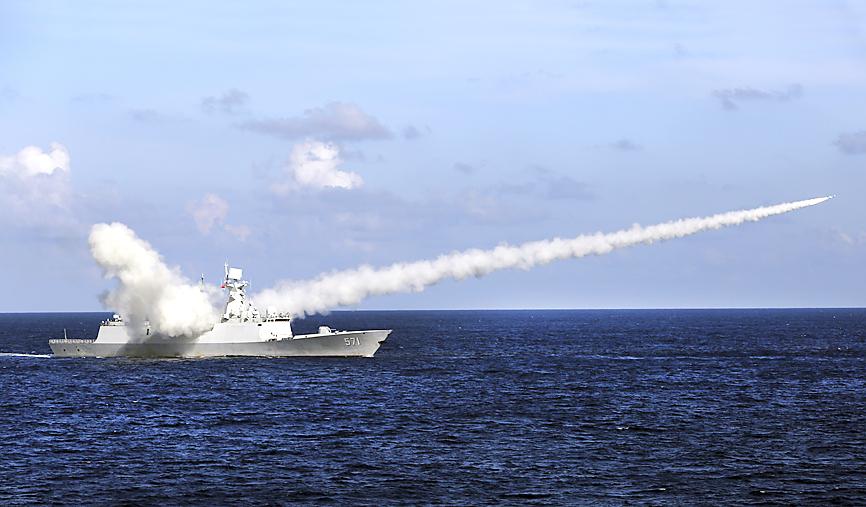The Ministry of Economic Affairs (MOEA) yesterday said that chips from Taiwanese semiconductor companies were not making their way into Chinese missiles “to the best of our knowledge.”
A report in yesterday’s Washington Post alleged that a Chinese company named Phytium Technology Co (飛騰) used chips made by Taiwan Semiconductor Manufacturing Co (TSMC, 台積電), along with US software, in advanced Chinese military systems.
“TSMC has long placed strict controls on their chips. The export of high-tech products from Taiwan is also highly regulated,” Minister of Economic Affairs Wang Mei-hua (王美花) said.

Photo: Zha Chunming / Xinhua via AP
“According to our understanding, none of the end uses for those products was military,” she added.
“To the best of our knowledge, TSMC’s exports not only meet Taiwanese standards, they also comply with applicable US regulations,” Wang said. “If information emerges that shows differently, we will of course investigate.”
Given the high volume of chip exports from Taiwan, the Bureau of Foreign Trade would educate exporters more to ensure that Taiwanese and international regulations are being followed, Wang said.
“TSMC has a rigorous export control system in place, including a robust assessment and review process on shipments to specific entities that are subject to export control restrictions,” the chipmaker said in an e-mailed response to the report.
“Moreover, TSMC has put in place processes to help identify abnormal circumstances in a transaction with due-diligence follow-up. With these processes already in place, we are not aware of a product manufactured by TSMC that was destined for military end-use, as alleged in the coverage,” it said.
The Washington Post article cites Ou Si-fu (歐錫富), a research fellow at the Institute for National Defense and Security Research (國防安全研究院), as well as an anonymous analyst.
Ou told the Taipei Times by telephone that he cannot speak specifically in regards to Phytium, but that the use of Taiwanese chips in Chinese military equipment would be “hard to trace.”
“The problem is that the chips are dual-use technology. They can be bought off the shelf for one application and then used in military equipment that is aimed right back at Taiwan,” Ou said.
Current Taiwanese and US safeguards for preventing Taiwanese chips from ending up in Chinese munitions are inadequate, Ou said, adding that meaningful measures for tightening up the flow of chips to China must come from the US.
“The US is ultimately in control of the upstream technology and equipment for the chips, even though Taiwan is the manufacturer,” Ou said. “They must be the ones to crack down.”
When asked whether Taiwanese can simply choose not to sell advanced chips to China, Ou said that it was unlikely.
“It would be asking them to voluntarily make less money and offend the Chinese at the same time,” Ou said.

CHAOS: Iranians took to the streets playing celebratory music after reports of Khamenei’s death on Saturday, while mourners also gathered in Tehran yesterday Iranian Supreme Leader Ayatollah Ali Khamenei was killed in a major attack on Iran launched by Israel and the US, throwing the future of the Islamic republic into doubt and raising the risk of regional instability. Iranian state television and the state-run IRNA news agency announced the 86-year-old’s death early yesterday. US President Donald Trump said it gave Iranians their “greatest chance” to “take back” their country. The announcements came after a joint US and Israeli aerial bombardment that targeted Iranian military and governmental sites. Trump said the “heavy and pinpoint bombing” would continue through the week or as long

TRUST: The KMT said it respected the US’ timing and considerations, and hoped it would continue to honor its commitments to helping Taiwan bolster its defenses and deterrence US President Donald Trump is delaying a multibillion-dollar arms sale to Taiwan to ensure his visit to Beijing is successful, a New York Times report said. The weapons sales package has stalled in the US Department of State, the report said, citing US officials it did not identify. The White House has told agencies not to push forward ahead of Trump’s meeting with Chinese President Xi Jinping (習近平), it said. The two last month held a phone call to discuss trade and geopolitical flashpoints ahead of the summit. Xi raised the Taiwan issue and urged the US to handle arms sales to

BIG SPENDERS: Foreign investors bought the most Taiwan equities since 2005, signaling confidence that an AI boom would continue to benefit chipmakers Taiwan Semiconductor Manufacturing Co’s (TSMC, 台積電) market capitalization swelled to US$2 trillion for the first time following a 4.25 percent rally in its American depositary receipts (ADR) overnight, putting the world’s biggest contract chipmaker sixth on the list of the world’s biggest companies by market capitalization, just behind Amazon.com Inc. The site CompaniesMarketcap.com ranked TSMC ahead of Saudi Aramco and Meta Platforms Inc. The Taiwanese company’s ADRs on Tuesday surged to US$385.75 on the New York Stock Exchange, as strong demand for artificial intelligence (AI) applications led to chip supply constraints and boost revenue growth to record-breaking levels. Each TSMC ADR represents

State-run CPC Corp, Taiwan (CPC, 台灣中油) yesterday said that it had confirmed on Saturday night with its liquefied natural gas (LNG) and crude oil suppliers that shipments are proceeding as scheduled and that domestic supplies remain unaffected. The CPC yesterday announced the gasoline and diesel prices will rise by NT$0.2 and NT$0.4 per liter, respectively, starting Monday, citing Middle East tensions and blizzards in the eastern United States. CPC also iterated it has been reducing the proportion of crude oil imports from the Middle East and diversifying its supply sources in the past few years in response to geopolitical risks, expanding